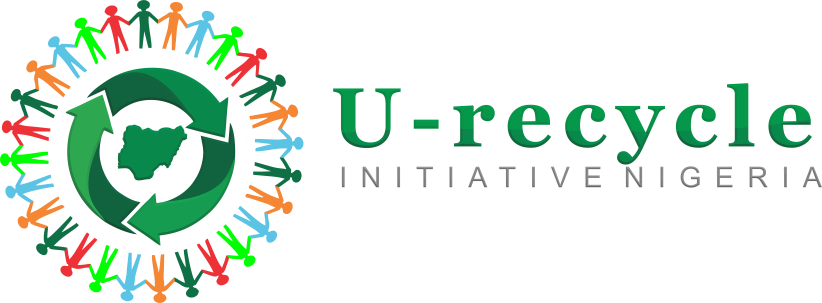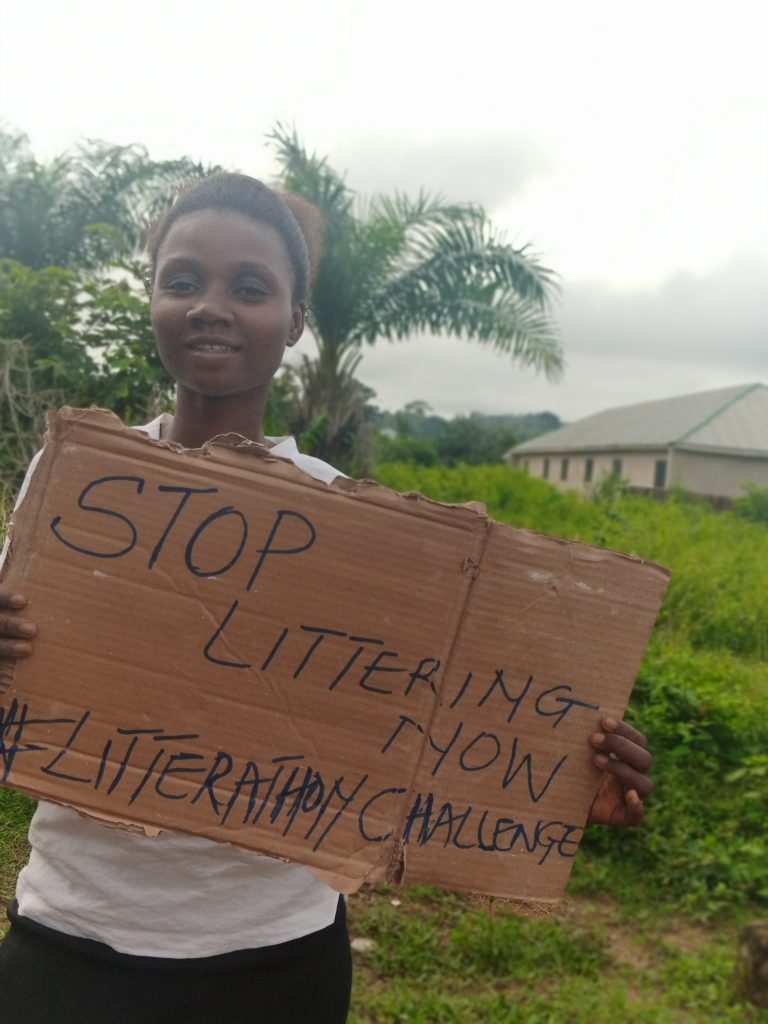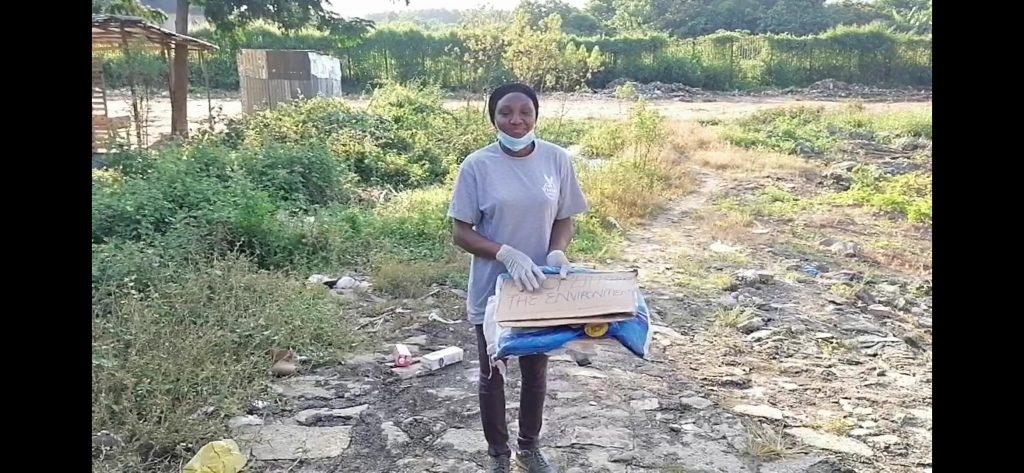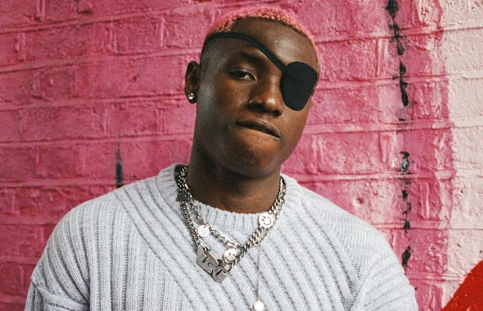Greta Thunberg , a 17-year-old from Sweden, has become the face of climate change activism. Over the last two years, the teenager has entered the global spotlight as the leader of a youth movement that's pushing governments and corporations to address the climate crisis. Closer home in Africa, Oluwaseyi Moejoh is leading a recycling revolution. We caught up with her and she let us in on her work.
 KB: Tell us a bit about the Litterathon challenge you recently participated in?Seyi: So In June, I participated in the 2020 Ocean Heroes Bootcamp organised by the Ocean Heroes Network, which provided me with more knowledge, tools and a network to create campaigns and projects focused on addressing environmental issues.Due to the pandemic, the 2020 Ocean Heroes Bootcamp, which was supposed to be an in-person event, was switched to a virtual Bootcamp. I was particularly inspired by how the Ocean Heroes Network was able to pivot and how remarkably successful the Bootcamp was at having a lot of young people participate across different countries and time zones. Initially my team at U-recycle Initiative had a lot of plans for 2020 but due to the pandemic we were inactive so I thought to myself, "in what ways can we engage people to act for the environment even during this period when we can't meet in large groups?" and that was how the Litterathon Challenge came about. The Litterathon Challenge is a litter cleanup challenge where young people across Africa are challenged to pick as much litter as they can within a day or days. The goal of the Litterathon Challenge is to mobilize and inspire African youths to engage in the global environmental movement against waste pollution, irrespective of their locations. In addition, create awareness to deter people from littering.Our first Litterathon, which was the first of its kind in Africa, was amazing with the participation of over 95 vibrant African youths from 18 cities in 7 African countries. Moving forward our team plans to organise more Litterathon Challenges periodically with the long-term vision of mobilizing tens of thousands of youths in more African countries and beyond. This project was organized by the U-Recycle Initiative with support from Plogging Nigeria, Afterbreak Magazine Namibia, the Ocean Heroes Network, Litterati, Yo-Waste Uganda, Rotaract Club of Lasucom, Gambia Ocean Heroes and more.
KB: Tell us a bit about the Litterathon challenge you recently participated in?Seyi: So In June, I participated in the 2020 Ocean Heroes Bootcamp organised by the Ocean Heroes Network, which provided me with more knowledge, tools and a network to create campaigns and projects focused on addressing environmental issues.Due to the pandemic, the 2020 Ocean Heroes Bootcamp, which was supposed to be an in-person event, was switched to a virtual Bootcamp. I was particularly inspired by how the Ocean Heroes Network was able to pivot and how remarkably successful the Bootcamp was at having a lot of young people participate across different countries and time zones. Initially my team at U-recycle Initiative had a lot of plans for 2020 but due to the pandemic we were inactive so I thought to myself, "in what ways can we engage people to act for the environment even during this period when we can't meet in large groups?" and that was how the Litterathon Challenge came about. The Litterathon Challenge is a litter cleanup challenge where young people across Africa are challenged to pick as much litter as they can within a day or days. The goal of the Litterathon Challenge is to mobilize and inspire African youths to engage in the global environmental movement against waste pollution, irrespective of their locations. In addition, create awareness to deter people from littering.Our first Litterathon, which was the first of its kind in Africa, was amazing with the participation of over 95 vibrant African youths from 18 cities in 7 African countries. Moving forward our team plans to organise more Litterathon Challenges periodically with the long-term vision of mobilizing tens of thousands of youths in more African countries and beyond. This project was organized by the U-Recycle Initiative with support from Plogging Nigeria, Afterbreak Magazine Namibia, the Ocean Heroes Network, Litterati, Yo-Waste Uganda, Rotaract Club of Lasucom, Gambia Ocean Heroes and more. KB: You're also a creative director at Artfully Moe. Is this an eco friendly start up?Seyi: Artfully Moe is a small business I run, where I make and sell bespoke handcrafted items like tote bags, knapsacks, hairbands, padded notebooks, wristbands and more. I try to be eco-friendly as much as possible in my business by avoiding the use of plastic packaging or by switching to eco-friendly packaging. Yes most times packing products in shiny plastic bags may look more appealing to the customer, however I am aware that plastic packaging poses threats to the environment and that is of more concern.
KB: You're also a creative director at Artfully Moe. Is this an eco friendly start up?Seyi: Artfully Moe is a small business I run, where I make and sell bespoke handcrafted items like tote bags, knapsacks, hairbands, padded notebooks, wristbands and more. I try to be eco-friendly as much as possible in my business by avoiding the use of plastic packaging or by switching to eco-friendly packaging. Yes most times packing products in shiny plastic bags may look more appealing to the customer, however I am aware that plastic packaging poses threats to the environment and that is of more concern.KB: Are you hoping to specialize in environmental law after graduation?Seyi: Yes I intend to specialize in Environmental Law or some other related Masters in Environmental sustainability/circular economy. I have come to realise that here in Africa, we need more sustainable policies and robust implementation in order to tackle the pervasive issues that threaten our environment. It is essential that we protect the livability of our continent and planet for the present and future generations.KB: Fast forward 5 years later, what piece of legislation will Seyi advocate for that'll really help with environmental conservation in Africa?Seyi: I would like to say a legislation to ban all unnecessary single use plastic in at least 70% of Africa BUT I'm being hopeful that before 5 years time, legislation would have been made in many African countries to ban the use of unnecessary single-use plastic because scientists speculate that in 2025 there will be more plastic than fish in the ocean. I'm trying to picture this in my mind and wow, it's a really frightening image and I really don't want this to be the case.KB: Do you feel like our governments are doing enough to reduce the use of plastics in our continent?Seyi: Hmmm... so there have been various efforts by the government so far and some countries like Rwanda are setting a remarkable example on proper waste management systems, however African countries have barely scratched the surface in tackling the issue of plastic pollution. I think one of the reasons for this is because of the very little focus that the government places on the issue, which is due to the myriad of economic, societal, health and security challenges our continent faces. However, I strongly believe that this issue is like a timebomb; it needs to be treated urgently and effectively. Hence, we must explore more ways we can attract and sustain the government's attention and efforts on the issue while reinforcing the work we change-makers, social entrepreneurs and innovators do in tackling plastic pollution.KB: How can more young Africans across the continent take an active role in recycling in their communities?Seyi: Young Africans can take an active role in recycling by identifying recycling companies or ventures around them, registering on the company's collection services in order to begin recycling their waste.Sadly, recycling here in Africa is very minimal because a lot of communities lack proper basic waste management systems. This is why we need the government to support by providing recycling collection services and plants or by funding and training youths to begin such in numerous communities.Nevertheless, with or without government support I will strongly encourage young Africans to take up responsibility. You can start up mini or large recycling ventures in your communities through accessing funding, mentorship and training via various international and local opportunities.View this post on Instagram
 KB: You wear so many hats for such a young person. How do you decompress?Seyi: Honestly, I'm still exploring ways to decompress well, however I try as much as possible to breathe, rest and live healthily. Taking deep breaths from time to time does a lot for me.KB: Which environmental activists do you look up to? Seyi: Greta Thunberg; I admire her courage and resilience in speaking up and mobilizing young people. Melati Wijsen is another big inspiration; I admire how she's committed to the cause and how she also works with indigenous women.KB: Finally, what's your parting short on recycling and conservation you'd like to leave our readers with?Seyi: "Small actions when multiplied by millions of people can transform the world."Dear reader, your actions matter. Our planet needs you to act. I believe you have a lot in you to create change, and there's a lot you can do to mitigate plastic pollution. You can start with the 3R's (Reduce, Reuse, Recycle). You can LEARN more about the problem, DITCH unnecessary single-use plastic (like plastic straws, cutleries, styrofoam etc.), You can SWITCH to eco-friendly metal or bamboo alternatives, and lastly EDUCATE others about the need for them to act too. Lastly don't forget to stop littering - it is very harmful to our environment. You can join us on our next #LitterathonChallenge.*Images: Courtesy
KB: You wear so many hats for such a young person. How do you decompress?Seyi: Honestly, I'm still exploring ways to decompress well, however I try as much as possible to breathe, rest and live healthily. Taking deep breaths from time to time does a lot for me.KB: Which environmental activists do you look up to? Seyi: Greta Thunberg; I admire her courage and resilience in speaking up and mobilizing young people. Melati Wijsen is another big inspiration; I admire how she's committed to the cause and how she also works with indigenous women.KB: Finally, what's your parting short on recycling and conservation you'd like to leave our readers with?Seyi: "Small actions when multiplied by millions of people can transform the world."Dear reader, your actions matter. Our planet needs you to act. I believe you have a lot in you to create change, and there's a lot you can do to mitigate plastic pollution. You can start with the 3R's (Reduce, Reuse, Recycle). You can LEARN more about the problem, DITCH unnecessary single-use plastic (like plastic straws, cutleries, styrofoam etc.), You can SWITCH to eco-friendly metal or bamboo alternatives, and lastly EDUCATE others about the need for them to act too. Lastly don't forget to stop littering - it is very harmful to our environment. You can join us on our next #LitterathonChallenge.*Images: Courtesy




